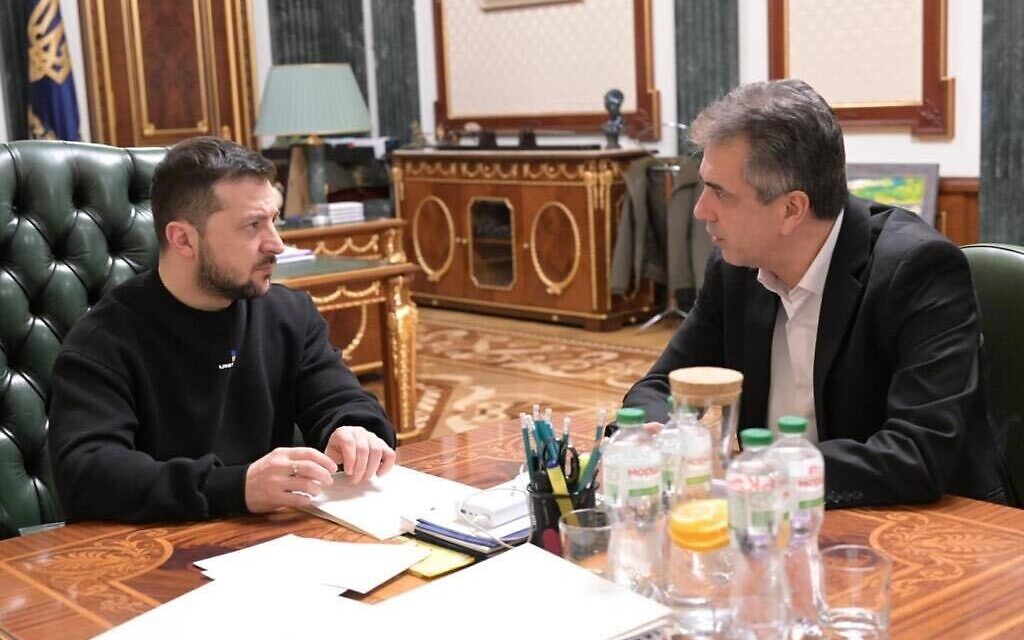At a press conference in Kyiv on February 24, the first anniversary of Russia’s invasion of Ukraine, the Ukrainian president, Volodymyr Zelensky, took a question from an Israeli reporter about Israel’s cautious position on the war.
Israel has adopted a nuanced stance toward the conflict in Ukraine, with many observers having described it as a policy of neutrality.
Israel’s overarching objectives are two-fold.
First, Israel seeks to preserve its 2015 deconfliction agreement with Russia, which enables the Israeli Air Force to bomb Iranian bases in Syria — Russia’s chief ally in the Arab world — without Russian interference. This agreement also permits Israeli aircraft to strike Hezbollah arms convoys en route to Lebanon from Syrian territory.
Second, the Israeli government seeks to ensure that the flow of Russian Jewish immigrants to Israel will remain unimpeded. Israel requires Russia’s goodwill and cooperation for this process to continue smoothly, if at all.
Shortly after the war erupted, Naftali Bennett, the then Israeli prime minister, flew to Moscow on a peace mission. His mediation efforts, though apparently appreciated by Russian President Vladimir Putin, were ultimately in vain.
Zelensky, who visited Israel in 2020, took note of these multifaceted factors in his reply to the Israeli reporter.
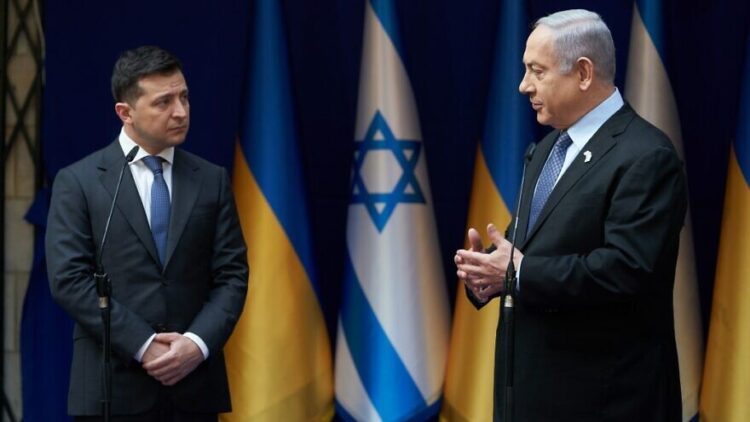
He said he understood Israel’s “complex situation” regarding its relations with Russia, Syria and Iran. But he added this crucial caveat: “I very much would like (Israel) not to be a mediator in this war, but to choose side — the Ukrainian side.”
It is doubtful whether Israel will accede to Zelensky’s request, American pressure notwithstanding. Israel cannot afford to antagonize Russia, a major player in Syria and an ally of Iran. This explains why Russia has a certain degree of leverage over Israel, and why Israel must be cognizant of Russian interests as they relate to Ukraine.
Israel’s ambassador to Ukraine, Michael Brodsky, said recently that the Ukrainian government has a better appreciation today of the devilishly complex geopolitical situation in which Israel finds itself.
Despite its reluctance to anger Russia, Israel is free to criticize its aggression in Ukraine and to show tangible support for Ukraine’s struggle to drive the Russians out of the Ukrainian occupied territories. Russia, after all, has been very critical of Israel’s policies in the Middle East, yet their bilateral relations have remained intact.
At his recent press conference, Zelensky implicitly acknowledged this phenomenon and noted there has been an “improvement” in Ukraine’s ties with Israel.
Israel has improved its relations with Ukraine in a variety of ways. It has upgraded its humanitarian assistance to Ukraine. It has begun supplying Ukraine with intelligence information concerning Russia’s deployment of armed Iranian in Ukraine. It votes for United Nations resolutions condemning the Russian invasion.
Earlier this month, Israeli Foreign Minister Eli Cohen visited Kyiv to reopen Israel’s embassy in Kyiv, thereby becoming the highest-ranking government official from Israel to conduct talks with Zelensky and his closest associates.
Cohen expressed support for Ukraine’s”territorial integrity and sovereignty.” He said that Israel “stands firmly in solidarity with the people of Ukraine.” He pledged to help Ukraine develop an early warning air defence system to fend off Russian bombardments of Ukrainian cities and critical infrastructure. He offered Ukraine $200 million in credits to build health care facilities.
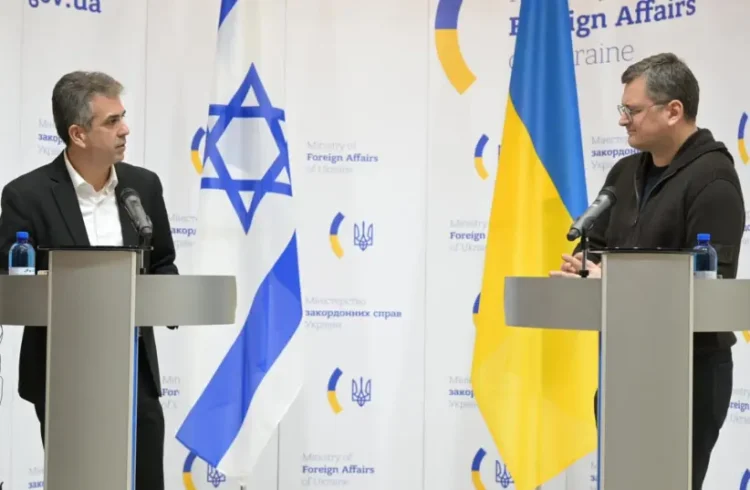
Striking an appreciative note, Zelensky said that Israel has “always been our important partner in the Middle East.” Ukrainian Foreign Minister Dmytro Kuleba tweeted that he was “thankful for all the support that Israel and Israelis have provided over the past year.”
Prior to visiting Ukraine, Cohen annoyed the Ukrainians by saying he would “speak less in public” about the war. He thereby implied he would accept the status quo, which is unbearable to Ukraine. And he fielded a telephone call from Russian Foreign Minister Sergei Lavrov during which he congratulated Cohen on assuming his new post and discussed bilateral and regional issues.
The phone call irked Ukraine’s usually outspoken ambassador to Israel, Yevgen Korniychuk, who claimed that Israel’s policy on Russia’s invasion was “unclear.”
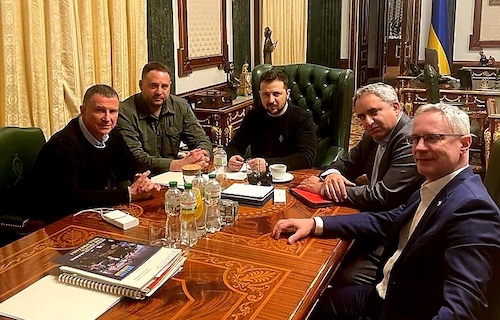
Four days after Cohen’s departure, the chairmen of the Israel-Ukraine Friendship Society, Yuli Edelstein and Ze’ev Elkin, met the Ukrainian leadership in Kyiv and, in a statement, called on Israel to adopt a stronger position against Russia. Their recommendation carries some weight. Edelstein is chairman of the Knesset’s Foreign Affairs and Defence Committee, while Elkin is a former government minister who has accompanied Israeli prime ministers to Russia in the capacity as an interpreter.
On February 23, in line with their views, Israel, along with 140 countries, voted for a non-binding resolution at the United Nations General Assembly urging Russia to end hostilities and withdraw its troops from Ukraine.
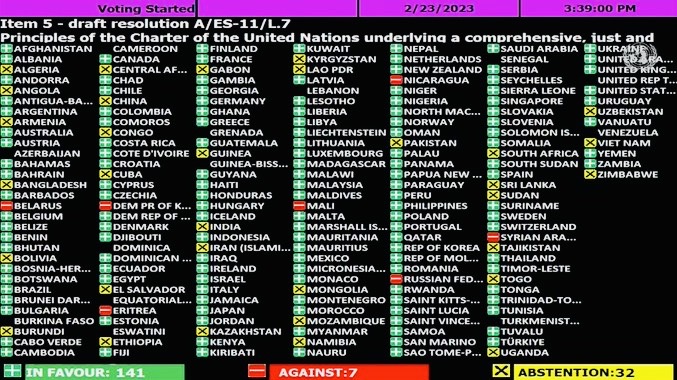
Israel’s ambassador to the United Nations, Gilad Erdan, noted that its pro-Ukrainian position has been consistent. “In the past year, Israel has stood alongside the people of Ukraine both on the ground and here at the UN,” he said.
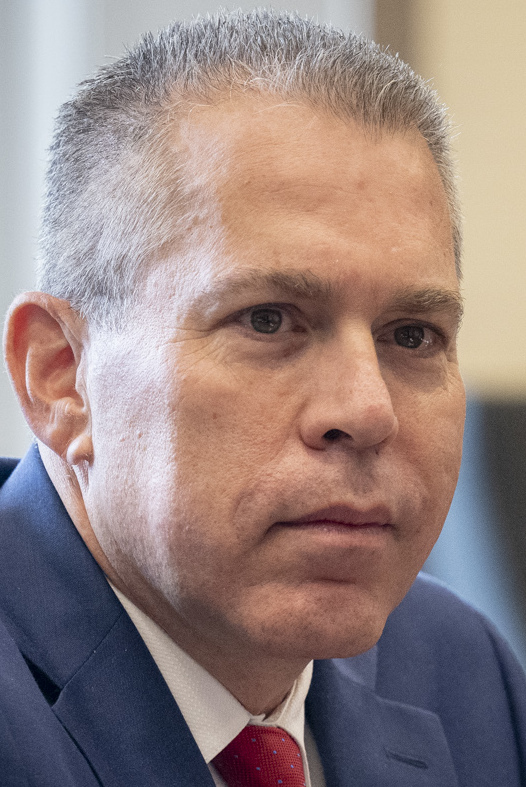
Israel, however, has repeatedly rejected insistent Ukrainian requests for the Iron Dome anti-missile defence system. And much to Ukraine’s dissatisfaction, Israel has neither issued a public denunciation of Russia’s invasion, nor has it imposed economic sanctions on Russia.
Despite Israel’s careful approach, Russia has occasionally lambasted Israel’s ongoing air campaign in Syria, the latest strike of which occurred on February 19 and killed five Syrian and Iranian officials in Damascus. Branding it as “a flagrant violation” of international law, Russian Foreign Ministry spokeswoman Maria Zakhorova said, “We strongly urge the Israeli side to stop armed provocations against the Syrian Arab Republic and refrain from steps that are fraught with dangerous consequences for the entire region.”
Despite such Russian rebukes, Putin has attempted to maintain cordial relations with Israel. By all accounts, he appears to admire Israel’s military strength and its ideological commitment to its historic ideals.
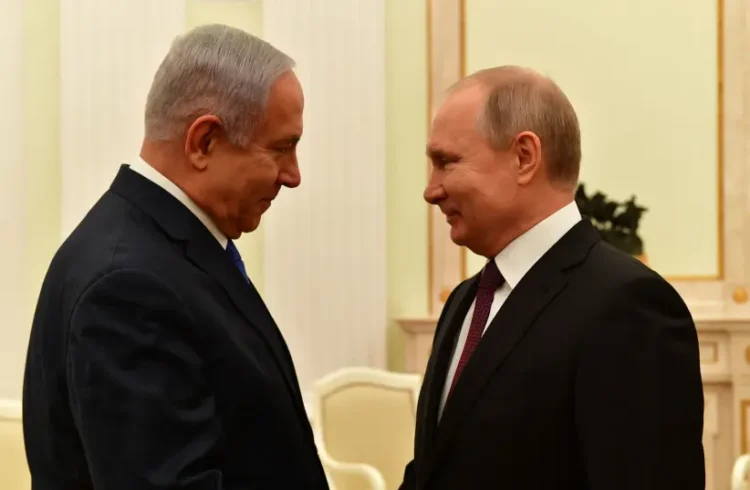
The current Israeli prime minister, Benjamin Netanyahu, visited Putin quite regularly after Russia dispatched an expeditionary force to Syria in 2015 to prop up President Bashar al-Assad regime, which has been engulfed in a civil war since 2011. Netanyahu claimed that Israel’s relationship with Russia was advantageous to Israeli regional interests.
During the 2019 election in Israel, Netanyahu ordered giant-sized banners of Putin and himself to be draped on high buildings.

Similarly, despite pressure from Western states, Netanyahu declined to condemn Russia’s annexation of Crimea in 2014.
After his return to power last December, Netanyahu took a congratulatory call from Putin. At around this time, Netanyahu disclosed he would review Israel’s policy on the war in Ukraine. Several weeks ago, he hinted he would examine the possibility of sending the Iron Dome to Ukraine, but he refused to make “any firm commitment.”
Netanyahu’s predecessor, Yair Lapid, publicly condemned Russian attacks on civilians and refused to engage with either Putin or Lavrov.
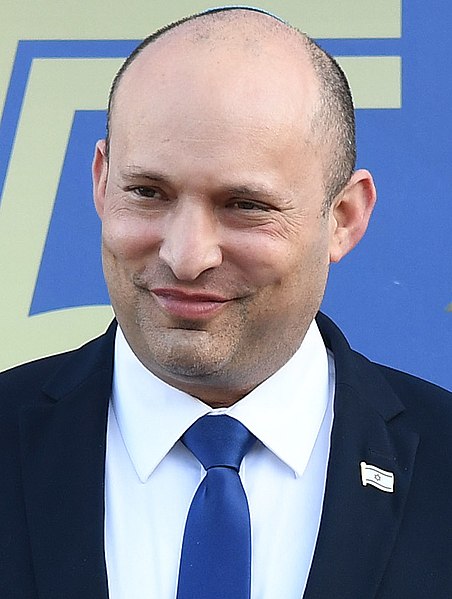
Lapid’s predecessor, Bennett, walked a fine line between Russia and Ukraine. “We are not in the same position as other countries,” he explained. “We have Russia just over our border in Syria. We have to take into consideration the presence of large Jewish communities in both Russia and Ukraine which would be impacted. And besides, it’s useful for everyone to have a government like Israel which has good ties with both sides.”
Bennett’s pragmatic comments illustrate the complexity and dexterity of Israel’s current policy on the war in Ukraine.
